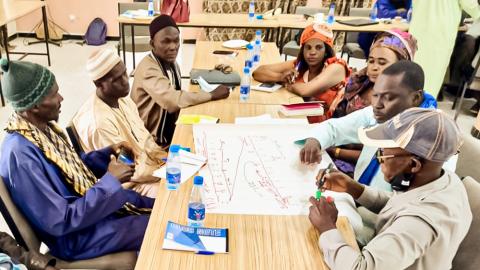
Stakeholder survey: index-based insurance for farmers in Senegal
Despite the role insurance can play in protecting farmers against climate risks, agricultural insurance is difficult to obtain in Senegal as providers find it costly to develop and distribute. As a result, 90% of Senegalese smallholder farmers are not insured.

To address this shortcoming, the SSNUP programme co-financed a project by impact investor Oikocredit that supported the microinsurance broker Inclusive Guarantee in distributing agricultural index insurance products to smallholder farmers. Index-based insurance is based on weather indices that automatically trigger compensation payments, thereby making it particularly suitable for small, remote farms.
As part of the project, Inclusive Guarantee adapted existing index-based insurance products to different crops and agroecological zones to make them affordable. In addition, a digital platform was developed to manage underwriting, policies and claims remotely for farmers based in remote areas.
In partnership with the National Agricultural Insurance Company of Senegal (CNAAS), Inclusive Guarantee uses aggregators such as cooperatives, microfinance institutions and agricultural businesses to distribute the insurance products. This distribution was complemented by awareness-raising sessions on the importance of insurance to protect against risks, how insurance works, financial management and good farming practices to increase the efficiency of production and reduce losses.
Follow-up impact assessment by SSNUP
SSNUP commissioned an in-depth survey to follow up the project based on interviews with smallholder farmers and other project stakeholders to gain a better understanding of the results and the impact. The survey assessed the farmers’ satisfaction with the services of Inclusive Guarantee and CNAAS and identified best practices and lessons learned from the insurers’ perspective.
The survey confirmed that insurance strengthened farmers' resilience by offering them unprecedented access to tailored products that protect their farms, boost their confidence and enable them to sustainably improve their agricultural methods by protecting their livelihoods in the face of hazards. The farmers’ overall perception of insurance was improved through practical experience of tangible benefits, for example in the event of compensation.
It was also found that the combination of insurance with training in good farming practices and financial management strengthens farmers' protection, meets their multiple needs, adds value to insurance and maximises its impact on farms.